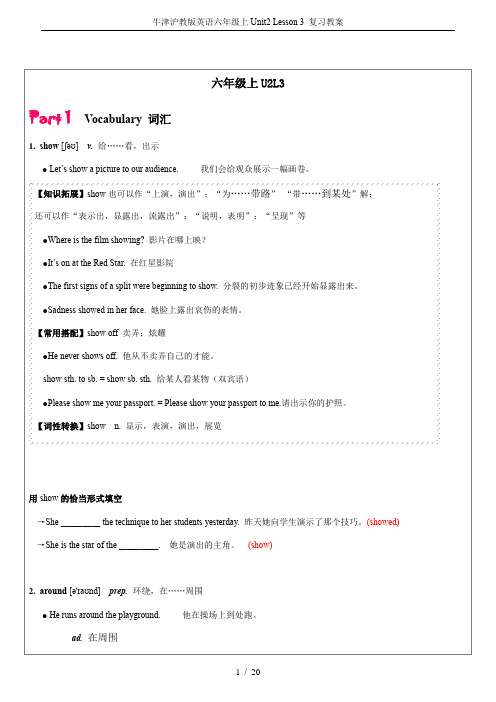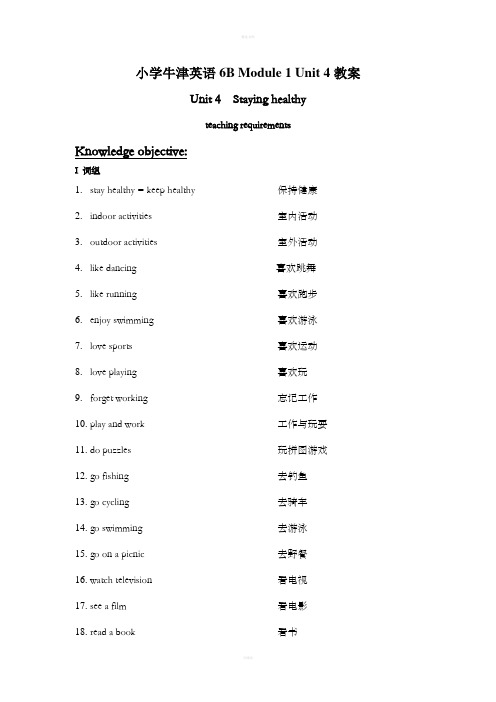牛津上海版英语六年级第二册 Module 1 Unit 3教案
- 格式:doc
- 大小:60.00 KB
- 文档页数:3

牛津沪教版英语六年级上 Unit2 Lesson 3 复习教案六年级上 U2L3Part 1 Vocabulary 词汇1. show [ʃəʊ] v. 给……看,出示 ● Let’s show a picture to our audience. 我们会给观众展示一幅画卷。
【知识拓展】show 也可以作“上演,演出”;“为……带路” “带……到某处”解;还可以作“表示出,显露出,流露出”;“说明,表明”;“呈现”等 ●Where is the film showing? 影片在哪上映? ●It’s on at the Red Star. 在红星影院 ●The first signs of a split were beginning to show. 分裂的初步迹象已经开始显露出来。
●Sadness showed in her face. 她脸上露出哀伤的表情。
【常用搭配】show off 卖弄;炫耀 ●He never shows off. 他从不卖弄自己的才能。
show sth. to sb. = show sb. sth. 给某人看某物(双宾语) ●Please show me your passport. = Please show your passport to me.请出示你的护照。
【词性转换】show n. 显示,表演,演出,展览用 show 的恰当形式填空 →She _________ the technique to her students yesterday. 昨天她向学生演示了那个技巧。
(showed) →She is the star of the _________. 她是演出的主角。
(show)2. around [ə'raʊnd] prep. 环绕,在……周围 ● He runs around the playground. 他在操场上到处跑。
ad. 在周围1 / 20牛津沪教版英语六年级上 Unit2 Lesson 3 复习教案 ● You have 15 minutes to look around. 你有 15 分钟的时间到周围看看。

小学牛津英语6B Module 1 Unit 4教案Unit 4 Staying healthyteaching requirements Knowledge objective:I 词组1.stay healthy = keep healthy 保持健康2.indoor activities 室内活动3.outdoor activities 室外活动4.like dancing 喜欢跳舞5.like running 喜欢跑步6.enjoy swimming 喜欢游泳7.love sports 喜欢运动8.love playing 喜欢玩9.forget working 忘记工作10.play and work 工作与玩耍11.do puzzles 玩拼图游戏12.go fishing 去钓鱼13.go cycling 去骑车14.go swimming 去游泳15.go on a picnic 去野餐16.watch television 看电视17.see a film 看电影18.read a book 看书19.play computer games 玩电脑游戏20.play tennis / badminton 打网球/羽毛球21.play basketball in the playground 在操场上打篮球22.play the piano 弹钢琴23.make a model 制作模型24.have a barbecue 进行一次烧烤25.fly kites 放风筝26.health problem 健康问题27.have a headache 头疼28.have a stomach ache 肚子疼29.have a cold 感冒30.have a fever 发烧31.have a sore throat 喉咙疼32.have toothache 牙疼(注意没有“a”)33.I’m afraid 恐怕(表示婉转语气)34.too much + 不可数名词太多35.too many + 可数名词36.too little+ 不可数名词太少37.too few + 可数名词38.watch too much television 看太多的电视(*watch television for too long)39.watch less television 看少一点电视40.wear enough clothes 穿足够多的衣服41.*put on 穿上42.wear more clothes 穿更多的衣服43.eat too much spicy food 吃太多的辛辣食物44.have exercise 做运动45.once a day 一天一次46.twice a week 一周两次47.three times a month 一个月三次48.go to bed late 晚睡49.go to bed early 早睡50.practise swimming 练习游泳51.*practise doing sth. 练习做某事52.help do the housework 帮助做家务53.*help sb. (to) do sth./ help sb. with sth. 帮助某人做某事II. 词性转换1.act (v.) — activity (n.)— activities (pl.) — *active (a.)e.g. We take part in all kinds of activities.He is very active in class.2.health (n.) — healthy (adj.) — unhealthy (a.)e.g. Health is the most important thing.You should eat healthy food.Eating too much ice cream is unhealthy.3.real (adj.) — really (adv.)e.g. It’s really cold today.He who doesn't reach the Great Wall is not a real man.4.tooth (n.) — teeth (pl.) —toothachee.g. Too much sweet food is bad for your teeth and you’ll have toothache.5.fun (n.)—* funny (a.)e.g. The children had fun at the beach yesterday.It’s a funny story.6.many/much (a. ad.) —moree.g. You should drink more water.7.little — less; few — fewere.g. You should watch less television.8.one — once; two — twicee.g. I go to school once a week.III. 语言点/句型1. stay1) *stay healthystay保持,相当于keep, 后接形容词2) stay with his cousinstay逗留2. like / love / enjoy + doing1) enjoy后加名词或动名词e.g. Tom enjoys the film.He enjoys running.* enjoy oneself = have a good time 玩得高兴2) like to do / like doing前者强调某一具体行为,后者则强调抽象概念或某一类事物e.g. I like to read his novel.I like reading.3. forget doing sth. 忘记做过某事*forget to do sth.忘记去做某事e.g. He forgot to close the window.I will never forget my 14th birthday.* remember to do sth. 记得去做某事*remember doing sth.记得做过某事4. play basketball; play the piano球类运动前不加the, 而乐器前要加the5. favourite (adj.) = like…best 最喜爱e.g. I like doing puzzles best. = Doing puzzles is my favourite.6. 用动名词来表述一些活动的名称e.g. swimming, making a model7. --- Why do I always have a headache?--- It’s because you watch too much television, I’m afraid.1) 对because引导的从句,只要求理解和模仿操练,不做语法分析。


六年级下册英语教案-Module 1第三课时Unit 2 1~2 外研版一、教学内容本节课主要内容为外研版六年级下册英语教材 Module 1第三课时 Unit 2 的1~2部分教学。
二、教学目标1.能够听懂、理解、读写本节课所学单词:mouth, ear, nose, eye.2.能够掌握如何用正确发音和语调来表达与五官有关的单词。
3.能够描述身体的部位,如“我的嘴巴是在脸上的”。
4.能够在实际情境中运用所学知识,如与他人伙伴玩憨笑游戏等。
三、教学步骤1. 预热活动•与学生们进行简单问候,询问他们如何度过上个周末,调整好课堂氛围。
2. 学生学习•通过展示课堂屏幕上五官的图片,辅导学生们理解口、耳、鼻、眼与其它身体部位的不同之处。
•呈现听力材料并帮助学生们跟读,加强对五官单词的记忆。
•请学生在纸上画出人脸,然后辅导他们写出人体的不同部位,并在课堂上互相评估,以加深他们对所学知识的理解和把握。
•与学生们分享面部表情,并帮助他们掌握如何表达与五官有关的单词,如“张嘴、闭上眼睛、摸鼻子等”。
3. 运用知识•在课堂上玩憨笑游戏,以帮助学生们在乐趣中运用所学知识,并激发他们对英语学习的兴趣。
•安排1对1对话,辅导学生们根据自己的面部感觉来描述自己的部位,如“我的嘴巴是在脸上的”,以帮助他们将所学知识运用到实际生活中。
4. 总结•与学生们分享所学内容,并帮助他们回忆一些形容词和短语,如“长得漂亮”,“有点小”,“看起来非常严肃”等,以加强他们的口语会话能力。
四、教学评估•分配练习题,如复述课堂上所学定语从句,并要求学生写作,如“我的嘴巴很软,我的眼睛很快”等等。
•对学生完成的作业进行评估,并根据学生的反馈,调整教学策略,以提高他们的学习效果。
五、教学反馈•总结课堂上的亮点和不足,并帮助学生们反思自己的表现,以便日后改进教学策略和提高学习成效。
六、结语英语学习需要不断积累和灵活运用,并需要一位好的英语老师来辅导你,帮助你以最小的代价取得最大收获。


M1U1 Family and relatives1st PeriodI. Pre-readingT: My name is Alice. These are my family and relatives. This is my grandfather. This is my grandmother. This is my mother and father. This is my uncle, he is my father’s brother. This is my aunt, and she is my father’s sister. This is my uncle,too. And he is my aunt’s husband. This is my brother and me. And these are my cousins, and they are my aun t’s kids.II. While-reading1. Look and read:Ask two students to work in pairs and read the dialogues.2. Read and answer (Game)To review the relationships among the relatives(1) Q1: He is my father’s brother. Who’s he?He’s your uncle.(2) Q2: She’s my father’s sister’s daughter. Who’s she?She’s your cousin.(3) Q3: He’s my mother’s father. Who’s he?He’s your grandfather.(4) Q4: She’s my daughter’s daughter. Who’s she?She’s your granddaughter.(5) Q5: She is my grandfather’s daughter. Her son is my cousin. Who’s she?She’s your aunt.(6) Q6: She’s my aunt’s sister. Her daughter is my sister. Who’s she?She’s your mother.(7) Q7: He is my father’s son. But he’s not my brother. Who’s he?It’s you.3. Look and readAlice has got a lot of presents and birthday cards from her family and relatives.Complete the cards on P.3.III. Post-reading:Task 1:Make a family tree of your own. Draw the pictures and write down the title for each member. Do the presentation with the post.2nd PeriodI. Pre-readingPresentation: My family treeII. While-reading:1. Listen and say 1(1) In pairs, talk about each other’s family members/relatives.e.g. S1: This is my ________.These areS2: How many ________ do you have?S1: I only have one ______./ I have ________.(2) Do the survey and complete the table. Then give us the report.I’ve just done the survey about family members/relatives. Here is the result. Ihave… brother(s) and my classmate has….brother(s).2. Listen and say 2What do you do with your family and relatives? Talk to a classmate, like this:e.g. S1: What do you do with your_____?S2: I alwaysusually __________ with my ________.sometimesS1: What else do you do with _______?S2: I sometimes … with _______.III. Post-readingTask 2: Writing: My familyThese are my family and relatives. This is ..... These are..... I always ....with (I)usually …with… I sometimes … with….IV. Words & expressions1. 家人和亲戚family and relatives2. 家谱a family tree3. 孙子和孙女们/外孙和外孙女们grandsons and granddaughters4. 从……得到许多礼物和生日贺卡get a lot of presents and birthday cards from…5. 生日快乐!Happy birthday (to sb.)!6.做一张生日贺卡make a birthday card7. 你的家庭成员之一one of your family members8. 谈论各自的家庭成员talk about each other’s family members9. 填表complete the table10. 你有多少叔叔/阿姨?How many uncles/aunts do you have?11. 我只有一个表(堂)兄妹I only have one cousin.12. 去购物go shopping13. 去游泳go swimming14. 去骑车go cycling15. 去饭店go to a restaurant16. 去公园go to the park17. 你和她还做了什么吗?what else do you do with her?18. 打羽毛球play badminton19. 打游戏play games20. 踢足球play football21. 看电影watch a film / watch films22. 我有时和他们一起看电视。
Module 1 City lifeUnit 2 At the airport教学目标:1.复习用be going to…表示打算和方案。
2.学习现在完成时。
3.学习用have to表示“必须 ,不得不。
〞4.学习现在完成时的一般疑问句及其肯定和否认答复。
教具准备:small blackboard radio课时安排:四课时第一课时教学过程:Step 1: Show the subject and the aims.1. Greetings.2. Show the subject and the aims.T: Boys and girls, today we’re going to learn Module 1 City life Unit 2 At the airport (板书)Here are our aims, they are…(利用小黑板出示学习目标) Learn aims:1.学习本课的单词。
Step2:第一次先学后教先学:Show the learn guide one:请同学们自己先根据单词后面的音标进行拼读单词。
I will give you about eight minutes,then we’ll check up.后教:1、指名学生自己读单词 ,先让其他同学帮助解决 ,必要时教师再作指导。
2、师领读单词。
3、学生边拼边读单词。
4、English and Chinese.Step3:第二次先学后教先学:Show the learn guide two:请同学们边拼读边记忆单词。
I will give you about eight minutes,then we’ll check up.后教:1.English and Chinese,Chinese and English.2.指名学生提问指名学生答复。
3.师出示汉语意思学生抢答。
Step5:Homework背写下本课的单词。
小学牛津英语6B Module 1 Unit 3教案
Unit 3 Dragon Boat Festival
teaching requirements
Knowledge objective:
I 词组: Module 1 Unit 3
语法重点:
1. 一般过去时:
a.概念:表示过去发生的动作或存在的状态。
b.常用的时间状语:
yesterday, last week/year…, in the past, …ago, in 2005, just now…
c.结构:主语+动词的过去式+…
e.g. He watched TV yesterday evening. 否定:He didn’t watch TV yesterday evening.
d.动词过去式的构成:
规则变化:
1)一般情况下在动词词尾直接加-ed. e.g. jump——jumped;
2)以不发音的e结尾的动词直接加-d. e.g. love ——loved
3)以辅音字母加y结尾的动词,去y变i+ed; e.g. study——studied
4)以重读闭音节结尾,且词尾只有一个辅音字母的动词,双写最后一个辅音字母,
再加-ed. e.g. stop——stopped
不规则变化:参见教材P103
2. 词性转换
●celebrate v. 庆祝*celebration n. 庆祝
●(be) born v. 出生bear v. 生
⏹ e.g. Alice was born in London in 2005.
●country n.. 国家; 乡下countryside n. 郊外,郊野
●advice n.. 劝告; 忠告advise v. 劝告, 忠告, 建议
●sad adj. 悲伤的sadly adv. 悲伤地sadness n. 伤心,难过
●die v. 死; 死亡dead adj. 死的death n. 死亡
●later adv. 以后; 后来late adj. 迟的/ adv. 迟,晚
⏹ e.g. 5 minutes later 5分钟以后The boy was 5 minutes late.迟到了5分钟
●lose v. (lost, lost)输掉lost adj. 失去的,迷失的
⏹ e.g. I found my lost pen at last. 最后我找到了我丢失的钢笔。
●win v. (won, won)赢得winner n. 获胜者
●danger n. 危险; 风险dangerous adj. 危险的
●without prep. 没有with prep. 有;和……一起
●send v. (sent, sent)发送,寄sender n. 寄件人
●five num. 五fifth 第五
●salty adj. 咸的salt n. 盐
3. know sth. about sth./sb. 知道关于……的情况
4. would like to do sth. = want to do sth. 想要做某事
5. His job was to give advice to the king. 他的工作是给国王出谋划策。
a.动词不定式to give advice to the king 在句中做表语;
e.g. My hope is to become a nurse. 我的愿望是成为一名护士。
b.g ive advice to somebody 给某人提建议,相当于give somebody advice
c.advice 为不可数名词,一条建议:a piece of advice
6. It was the fifth day of the fifth lunar month of that year. 那一天是那一年的农历五月初五。
农历是中国传统的日历表示方法,在英文中要用序数词来表达农历某个月的某一天。
春节(农历正月初一):the first day of the first lunar month
元宵节(农历正月十五):the fifteenth day of the first lunar month
中秋节(农历八月十五):the fifteenth day of the eighth lunar month
7. 表示伴随:with/without
介词with表示“带着……”,“带有……”。
反义词为without。
e.g. Do you like coffee with or without milk? 你要喝奶咖还是清咖?
8. 表示对别人礼貌的邀请,如Would you like some…?
其肯定回答为:Yes,please.否定回答为:No,thanks.
9. 在表示两种相反态度的情况下可以说:I like…, but I don’t like…
10. I don’t like rice dumplings. I’d rather have a piece of pizza.
would rather do“宁愿, 宁可”, 后接动词原形,口语中常使用’d rather do的缩略形式,用于表示喜好、偏爱,相当于prefer to。
e.g. It is raining outside. I'd rather stay at home. 外面在下雨, 我宁可待在家里。
※would rather do =’d rather do
否定: would rather not do sth. = ’d rather not do
Ability objective:
1)Make the students know how to describe a festival.
Emotional objectives:
To foster the students’ interest to describe a festival.
Pre-task preparation:
Ask: 1) How many festivals do you know?
2)How do you celebrate them?
3)
Consolidation
1)Recite key words and phrases.
2)Recite ‘Look and read.。